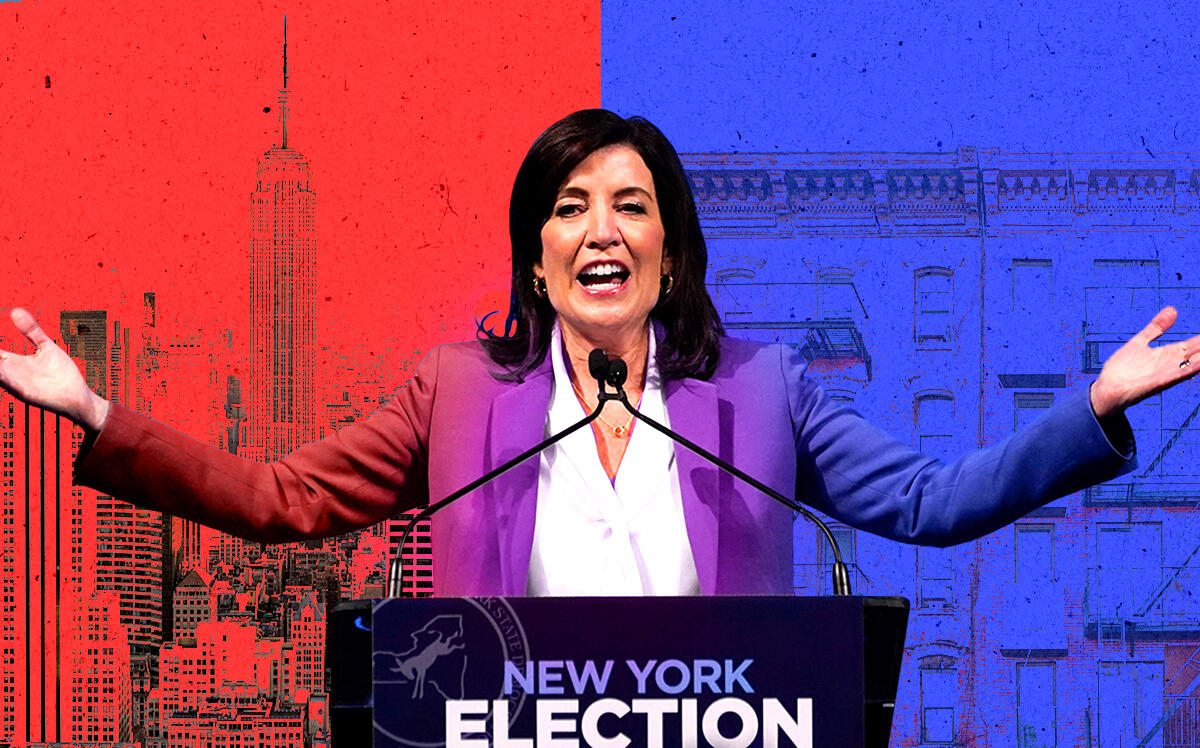Some property owners had thrown their support behind Rep. Lee Zeldin, won over by his stance on crime and confident that he would fix the state’s rent aid program. But his defeat Tuesday by Gov. Kathy Hochul doesn’t necessarily mean they are screwed.
Given that Hochul’s victory was by only 5 percentage points, the smallest margin in a New York governor’s race since George Pataki beat Mario Cuomo by 3 points in 1994, some expect the election results to be a moderating force on the governor.
That could bode well for some real estate-backed policies, such as reforms to the Emergency Rental Assistance Program, rent stabilization and the renewal or replacement of 421a, a property tax break for rental development in New York City.
Eric Dillenberger, a member of the landlord group Small Property Owners of New York, said SPONY looks forward to having “substantive conversations” about the effects of the 2019 rent stabilization law and the pitfalls of the rent program, known as ERAP.
“I think there was some broad hope that the Republicans would be more sympathetic to property owners and business owners,” he said of landlords’ support for Zeldin and GOP legislative candidates.
“Hopefully the new Assembly and Senate will be open to having real, genuine hard conversations about how we improve the situation we’re in without hurting owners more than they have already been hurt.”
Read more



Landlords have voiced frustration that the program, which is out of money, still accepts applications that trigger eviction protection. Tenants with pending applications can remain in their homes despite owing rent that far exceeds what ERAP would provide, even if it weren’t exhausted.
The Rent Stabilization Association, through two political action committees, donated to Zeldin, saying it supports candidates who “recognize the needs and issues that impact providers of affordable housing.”
Hochul has shown no sign of pushing to allow more than minimal rent increases when owners repair and upgrade individual apartments or buildings. But now she has four years to pass measures that might prevent another close election in 2026.
Democrats managed to maintain control of the Senate and Assembly, but relinquished some seats. It is unclear whether Democrats kept their supermajority — enough seats to override a gubernatorial veto if they vote unanimously.
”There was definitely a message sent that there needs to be more moderate messaging going forward,” said Jay Martin, executive director of the Community Housing Improvement Program.
But moderation is not a guarantee of victory. In fact, moderate Democrats struggled against Republican challengers in a number of races.
Unofficial results show Hudson Valley Sen. James Skoufis with a narrow lead over Republican Dorey Houle. Longtime Brooklyn Assembly members Steven Cymbrowitz and Peter Abbate Jr. appear to have been unseated by Republican challengers. Cybrowitz’s defeat means a new Assembly housing committee chair will be appointed.
Cea Weaver, coordinator for the Housing Justice for All, said it would be a “huge mistake” for Hochul to lean into moderate policymaking. She said the Democrat has progressives to thank for mobilizing voters against the threat of a Republican governor.
“She is not an inspiring candidate for Democrats,” she said. “It was hard to convince people that they needed to go out and vote.”
Even if Democrats lose their supermajority in the Senate, Weaver feels the chamber’s progressive members are better positioned now. The ousting of moderate senators including Elijah Reichlin-Melnick and Anna Kaplan pushes the chamber’s Democratic conference to the left, potentially paving a path forward for good cause eviction, she said.
Weaver acknowledged the measure would likely not pass in its current form, but more likely be amended and packaged with other housing measures.
The question for Democratic Senate leaders is whether they govern to appeal to moderate voters or to inspire progressives, given their candidates’ vulnerability in swing districts.
Martin, for his part, said it is a good time for some in the industry to reassess their strategy to “pine” for a Republican Senate and governor, and to refocus on working with those in office.
Hochul has indicated that she will announce a housing plan that could create up to 1 million homes, but the details on the plan are sparse. She has voiced support for encouraging the conversion of old office properties into housing, and is expected to revisit proposals to legalize accessory dwelling units and to lift caps on residential density.
She has also indicated she plans to revisit the replacement of the property tax break 421a, which expired in June. Hochul proposed a replacement program early this year, but withdrew it.
